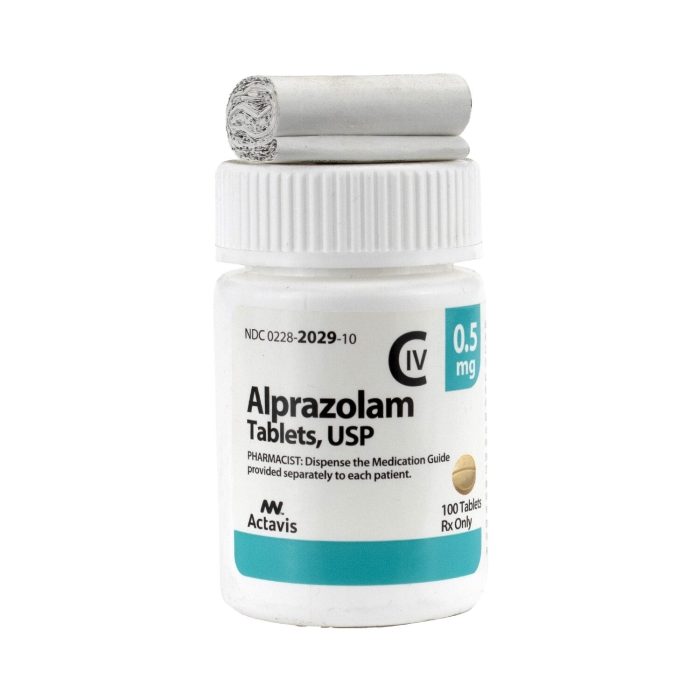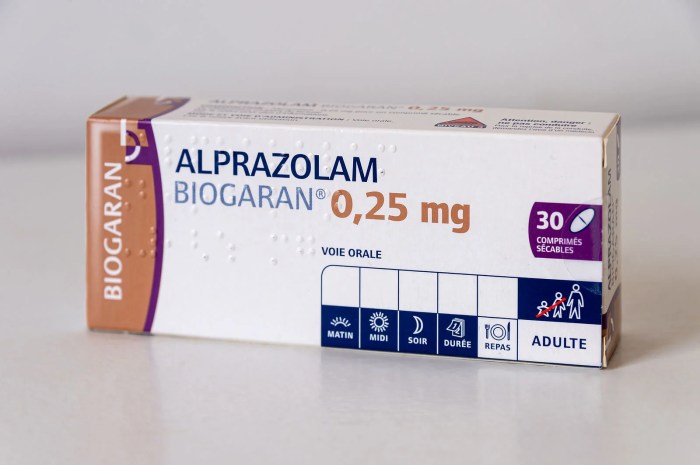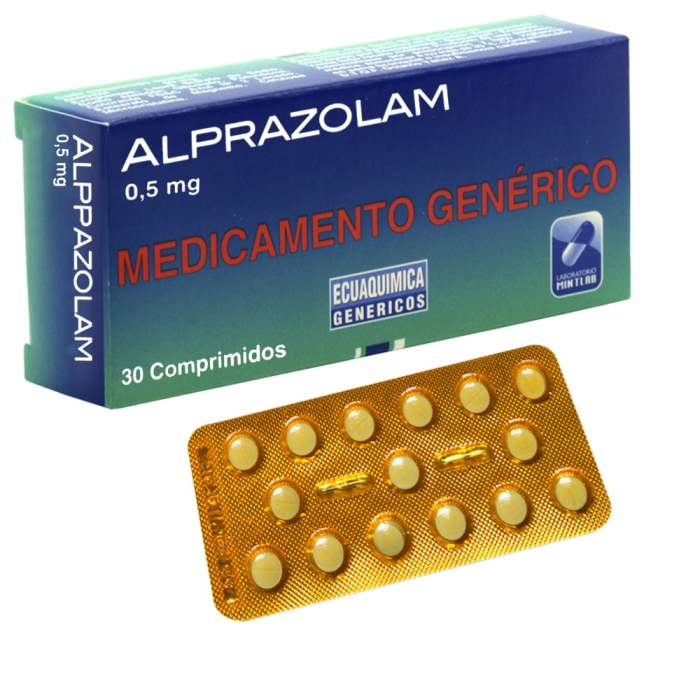Alprazolam, a widely prescribed medication, takes center stage in this exploration, offering insights into its therapeutic applications, potential side effects, and considerations for safe and responsible use. It’s a journey into the world of anxiety management, where alprazolam plays a significant role, but not without its complexities.
This comprehensive overview delves into the intricacies of alprazolam, examining its chemical makeup, classification, and mechanism of action. We’ll explore its therapeutic uses, including its effectiveness in treating anxiety disorders, panic attacks, and insomnia, while acknowledging the importance of understanding its potential adverse effects and safety considerations.
Alprazolam in Pregnancy and Lactation
Alprazolam, a benzodiazepine medication commonly prescribed for anxiety disorders, can pose significant risks to both the pregnant woman and the developing fetus. Its use during pregnancy and lactation requires careful consideration, weighing the potential benefits against the potential risks.
Potential Effects of Alprazolam on the Fetus and Infant
Alprazolam can cross the placenta and enter the fetal circulation, potentially affecting fetal development. Exposure to alprazolam during pregnancy has been linked to several adverse effects, including:
- Congenital malformations: Alprazolam use during pregnancy has been associated with an increased risk of congenital malformations, particularly cleft palate and heart defects. Studies have shown a statistically significant association between alprazolam use and an increased incidence of these birth defects.
- Withdrawal syndrome: Infants born to mothers who have been taking alprazolam regularly during pregnancy may experience withdrawal symptoms after birth. These symptoms can include tremors, irritability, feeding difficulties, and seizures.
- Low birth weight: Alprazolam use during pregnancy has also been associated with a higher risk of low birth weight. This can be due to various factors, including the potential for alprazolam to affect fetal growth and development.
- Respiratory distress: Infants exposed to alprazolam in utero may have an increased risk of respiratory distress at birth, possibly due to the medication’s effects on the central nervous system.
Alprazolam can also be excreted in breast milk, potentially exposing the nursing infant to the medication. The amount of alprazolam that passes into breast milk varies depending on several factors, including the mother’s dosage, the time since the last dose, and the infant’s age.
Risks and Benefits of Alprazolam Use During Pregnancy and Lactation
The decision to use alprazolam during pregnancy or lactation should be made on a case-by-case basis, weighing the potential risks to the mother and fetus against the potential benefits of treating the mother’s anxiety.
- Benefits: In some cases, the benefits of treating maternal anxiety with alprazolam may outweigh the risks to the fetus. For example, untreated anxiety can have negative effects on the mother’s health and well-being, which can indirectly affect the fetus.
- Risks: However, it’s crucial to be aware of the potential risks associated with alprazolam use during pregnancy and lactation. The potential effects on the fetus and infant, as discussed above, must be carefully considered.
Alternative Treatment Options for Anxiety During Pregnancy and Lactation
Whenever possible, alternative treatment options for anxiety during pregnancy and lactation should be explored. These options may include:
- Non-pharmacological therapies: Cognitive-behavioral therapy (CBT), relaxation techniques, and mindfulness practices can be effective in managing anxiety without the risks associated with medications.
- Other medications: Some antidepressants, such as selective serotonin reuptake inhibitors (SSRIs), have been shown to be relatively safe for use during pregnancy and lactation. However, it’s essential to discuss the risks and benefits of these medications with a healthcare professional.
- Lifestyle changes: Making healthy lifestyle changes, such as regular exercise, a balanced diet, and adequate sleep, can also help manage anxiety.
Alprazolam Abuse and Misuse

Alprazolam, a benzodiazepine commonly prescribed for anxiety and panic disorders, can be misused and abused, leading to serious consequences. Its potential for abuse stems from its ability to produce a sense of relaxation, euphoria, and reduced anxiety, making it attractive to individuals seeking these effects. However, using alprazolam for non-medical purposes can lead to dependence, overdose, and legal issues.
Factors Contributing to Alprazolam Abuse
Several factors contribute to the abuse and misuse of alprazolam, including:
- Accessibility: Alprazolam is a widely prescribed medication, making it readily available. This accessibility increases the potential for diversion and misuse.
- Social Pressure: The perception of alprazolam as a “party drug” can influence individuals to use it recreationally, especially among young adults and adolescents.
- Addiction Vulnerability: Individuals with a history of substance abuse or a family history of addiction are at increased risk of developing alprazolam dependence.
Risks and Consequences of Alprazolam Abuse
Misusing alprazolam carries significant risks and consequences, including:
- Dependence: Regular alprazolam use can lead to dependence, characterized by withdrawal symptoms when the drug is stopped or reduced. Withdrawal symptoms can include anxiety, insomnia, tremors, and seizures.
- Overdose: Overdosing on alprazolam can be fatal, especially when combined with other depressants such as alcohol or opioids. Symptoms of an overdose include drowsiness, confusion, slowed breathing, and coma.
- Legal Ramifications: Possession, distribution, and trafficking of alprazolam without a prescription are illegal and can result in criminal charges.
- Health Complications: Long-term alprazolam abuse can lead to various health problems, including liver damage, cognitive impairment, and respiratory depression.
Alternative Treatments for Anxiety: Alprazolam

While alprazolam can be effective in managing anxiety symptoms, it’s important to consider alternative treatment options that address the underlying causes of anxiety and promote long-term well-being. These approaches offer a holistic perspective on anxiety management and can be beneficial for individuals seeking sustainable relief.
Cognitive Behavioral Therapy (CBT)
CBT is a widely recognized and effective therapy for anxiety disorders. It focuses on identifying and challenging negative thought patterns and behaviors that contribute to anxiety. Through a collaborative process, therapists help individuals develop coping mechanisms and behavioral strategies to manage anxiety-provoking situations.
“CBT helps individuals learn to identify and challenge their negative thoughts and behaviors, replacing them with more realistic and helpful ones.”
Mindfulness-Based Stress Reduction (MBSR)
MBSR is a program that combines mindfulness meditation, gentle yoga, and education on stress management techniques. It teaches individuals to cultivate present-moment awareness and acceptance of their thoughts and feelings, reducing the intensity of anxiety symptoms.
“MBSR helps individuals develop a greater sense of self-awareness and acceptance, reducing the impact of stress and anxiety on their well-being.”
Lifestyle Modifications
Making healthy lifestyle changes can significantly impact anxiety management. These modifications include:
- Regular Exercise: Physical activity releases endorphins, which have mood-boosting effects and reduce anxiety levels.
- Balanced Diet: Consuming a nutritious diet rich in fruits, vegetables, and whole grains can improve mood and energy levels, contributing to better anxiety management.
- Adequate Sleep: Getting enough sleep is crucial for maintaining mental and emotional well-being. Sleep deprivation can exacerbate anxiety symptoms.
- Stress Management Techniques: Incorporating relaxation techniques like deep breathing exercises, progressive muscle relaxation, or meditation into daily routines can help reduce stress and anxiety.
- Social Support: Maintaining strong social connections and seeking support from loved ones can provide a sense of belonging and reduce feelings of isolation, which can contribute to anxiety.
Future Directions and Research

The field of alprazolam research is constantly evolving, with ongoing investigations exploring new avenues for safer and more effective treatments for anxiety disorders. Researchers are delving into the complexities of alprazolam’s mechanisms of action, seeking to develop novel therapeutic approaches that minimize the risk of dependence and side effects.
Personalized Medicine and Pharmacogenetics, Alprazolam
Personalized medicine aims to tailor treatments to individual patients based on their unique genetic makeup and other factors. Pharmacogenetics, a subfield of personalized medicine, focuses on how genetic variations influence drug response.
Researchers are investigating the role of pharmacogenetics in optimizing alprazolam therapy. Studies are underway to identify genetic markers that predict an individual’s susceptibility to alprazolam’s side effects or the likelihood of developing dependence.
By understanding these genetic variations, clinicians may be able to personalize alprazolam dosages and treatment strategies, maximizing therapeutic benefits while minimizing risks. This approach holds the potential to improve patient outcomes and enhance the safety of alprazolam treatment.
Understanding alprazolam involves navigating a delicate balance between its therapeutic potential and the risks associated with its use. While it can offer significant relief for those struggling with anxiety, it’s crucial to approach its use with caution and under the guidance of a healthcare professional. By understanding the complexities of alprazolam, we can empower ourselves to make informed decisions regarding its use and prioritize our well-being.
Alprazolam, a commonly prescribed medication for anxiety, is often used to manage short-term symptoms. However, it’s important to remember that it’s not a cure-all. If you’re dealing with a bacterial infection, you might need a different type of treatment, such as antibiotics like zerbaxa. Alprazolam is primarily for anxiety and should not be used to treat infections.